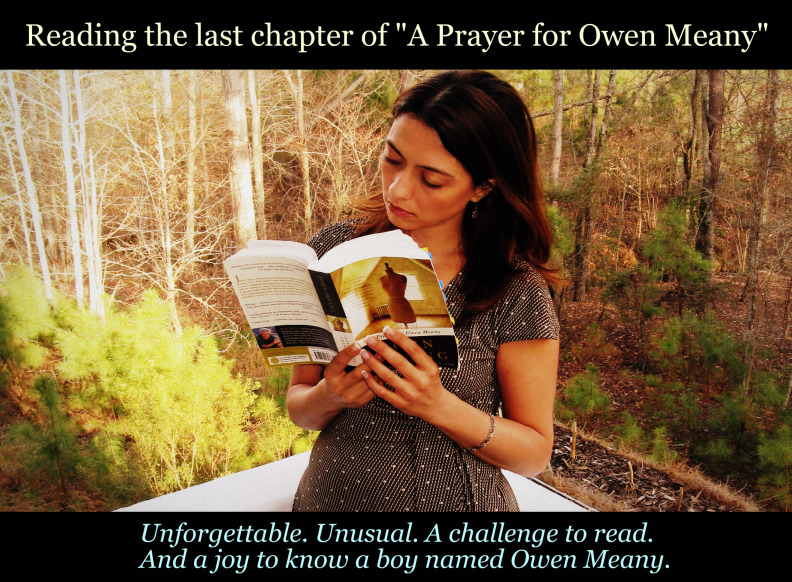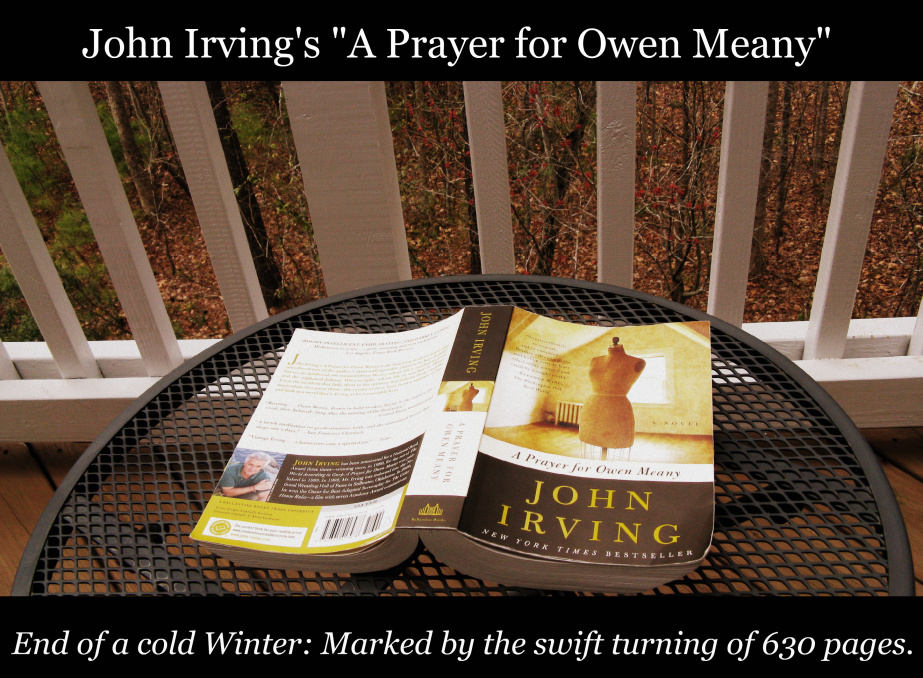
“A Prayer for Owen Meany” by John Irving is an uncommon story. It is a compelling read but not an easy one. The writing evokes so much anxiety, sadness, pleasure, frustration, and laughter throughout but most of all, you read with unquenchable curiosity about the character whose name bears the title of the book, a character you will be hard pressed to ever forget: Owen Meany.
The themes of Christianity along with discrepancies of various denominations, American politics and foreign policies, Vietnam war, and life in New England small towns among other similar subplots shape the backdrop of this book. Themes and elements which fall entirely outside my general reading genre. Even so, I believe we sometimes should seek diversion from our comfort zone both in life and in our reading. This most highly acclaimed book of the 20th century has to have something in store for me, I thought. Perhaps I will develop a new sense of appreciation and expand my horizons. Perhaps I will meet an unforgettable character or read the most memorable expression. Thus it is this impartial and patient mindset with which I set out to read and finish John Irving‘s “A Prayer for Owen Meany”.
My favorite description of this book is on the back cover: “….boys bonded forever in childhood: the stunted Owen Meany, whose life is touched by God, and the orphaned Johnny Wheelwright, whose life is touched by Owen.”
John Irving is a masterful storyteller. The Afterword in the book is particularly helpful in understanding how this book came about and why he wrote it in the fashion he did. Irving would not write the beginning sentence of his novels, for instance, until after he has thought through the entire novel and decided upon the main events and knows the end clearly. Indeed this is obvious as the first sentence of the book sums up the entire novel for the reader.
Irving’s writing style is decisive. He leaves little room for imagination on the fate or traits of his characters, he exposes their intentions and their notions clearly. He fills every gap and question sprinkled throughout the novel to full satisfaction on the last page. His skilled imagery and descriptions of situations, places, and characters leave you engrossed and captivated. He tugs at the reader’s mind and heart with supreme delicacy. There is a quality and a voice to the story that nearly convinced me of its truth in real life. It is however a work of fiction that is done remarkably well by a talented writer who was simply inspired by an idea: What if a small boy he had known in his childhood never grew up?
The unforgettable world of Johnny Wheelright and Owen Meany takes place in the 1950s in a New Hampshire small town. Johnny as the narrator is remembering his best friend, Owen Meany, a small boy with a very strange voice, an unusual gift of faith in God, and a foretelling of the future. Beyond being the best of friends, the life of Johnny Wheelwright is guided by Owen, especially after Johnny’s mother’s death, an event quite ironically caused by Owen’s foul ball at a doomed baseball game. How can a young boy go on being best friends with someone who killed his mother, albeit as a result of pure accident? While I find it impossible to imagine, the events which shape and guide Johnny’s life thereafter are unmistakably through Owen Meany in the course of an intact and undeterred friendship.
All in all, this is a book I am far too glad to have read. From the boys’ games and plays at Grandmother Wheelwright’s 80 Front Street home to their Christmas pageant plays, their holidays at the empty boy’s dormitories, their adventures with Johnny’s cousins and their days at Gravesend Academy and most of all, their dealing with loss of a beloved mother – as much of a mother to Johnny as to Owen – at an early age, this is definitely a bittersweet journey of two young boys through life. The humor is plentiful and entertaining and the beautiful themes of childhood and friendship remain prevalent in the entire novel.
While I praise Irving for the many traits mentioned, all of which attribute to the building blocks of his wonderful novel, I wish he had done a few things differently. Taking an impartial view of the 1960s politics and Vietnam war would be impossible, I imagine, for anyone who is touched by it but did it have to be such a central theme in Johnny’s story telling? Did he have to go on and on about the policies of the Reagan administration, the problems in his view with America’s foreign policies, and repeat ever so many times his indignation and criticism of Americans and American politics? Not only did I find those commentaries off-putting, (not to mention the questionable accuracies of either view when it comes to politics), I found no real place for them in the context of the novel.
The real irony of this is how little, if at all, Johnny Wheelwright himself contributes to his own homeland! What did Johnny Wheelwright ever do for his country, in the words of his favorite president, John F. Kennedy? The answer does not amount to much. He did terrible in school and would have failed if it weren’t for Owen Meany’s help, dodged the draft, fled to Canada and continued his role as a serial critic of a country that “Americans don’t care about“ and ironically found very little interest in Canada or Canadians to boot. It became increasingly difficult to find any compassion for a boy who lost his mother in such a tragedy and yet never quite made anything of himself despite his opportunities. Johnny Wheelwright may have thought that he found faith through Owen Meany, but he remains lost, dispirited, alone, cynical, and extremely unhappy, all in no small part caused not only by the death of his beloved mother but also that of his best friend, Owen Meany.
It is for Owen Meany that I read this book. I loved the character, mindset, thoughts, actions, words, perspective and impact of this small boy who never grows and his strange voice which never changes. It is in fact he who grows to full adulthood and maturity in thought and spirit while his body remains forever small. Through his strange voice, articulated with all capital letters throughout the book, I distinctly felt the presence of Owen Meany. In all situations, Owen epitomizes faith, loyalty, friendship, belief, service, kindness and generosity. The most strange circumstances and odd events test the unshaken faith of Owen and the absent faith of Johnny. Perhaps Johnny had to develop faith as a result of witnessing what he could only explain as miracles of intuition, and perhaps Owen Meany was just a big miracle in a small size. Whatever your thoughts may be, you will never forget the voice and presence of Owen Meany.

Reading is the best pastime for an active mind! If you like to see the other book reviews, check the index of In Print.
I think a book is worth the read even if you can mark even one place which you wish to remember. In “A Prayer for Owen Meany”, I did that countless times, and in the spirit of sharing them, I quote a select few of those fabulous passages below:
Pg 112 – As a daughter of a Persian family, this I can completely relate to!
Dan came from a very high-powered family; they were doctors and lawyers, and they disapproved of Dan for not completing a serious education. To have started out at Harvard and not gone on to law school, not gone on to medical school — this was criminal laziness; Dan came from a family very keen about going on. They disapproved of him ending up as a mere prep-school teacher, and of his indulging his hobby of amateur theatrical performances — they believed these frivolities were unworthy of a grown-up’s interest!
Pg 139 – On adjusting to death, very perceptive and true.
….the evening after her funeral, I felt she was gone when it was time for Dan to go home to the dorm. I realized Dan had choices — he could return to his dormitory apartment alone or I could offer to go with him or I could stay at 80 Front Street he could even stay in the other twin bed…….But as soon as I realized what Dan’s choices were, I also knew, they were — each of them — imperfect in their own way; I realized that the choices available to Dan, regarding where he could sleep, would be imperfect, forever, and that forever, there would be something unsatisfying about thinking of him alone.
Pg 199 – On Mr. Morrison, the mail man, not having a speaking part:
“IT’S A GREAT PART FOR A GREAT ACTOR”, Owen said stubbornly, “YOU HAVE TO BE A PRESENCE. THERE’S NOTHING AS SCARY AS THE FUTURE. YOU KNOW EVERYTHING TO COME.”, he screamed at the disgruntled mailman. “IF YOU WALK ONSTAGE AS IF YOU KNOW THE FUTURE, I MEAN EVERYTHING — YOU’LL SCARE THE SH1T OUT OF EVERYONE”
Pg261 — on Grandmother’s initial views on Television (which completely oppose her future obsession with the TV)
She drew the line at television. It took no effort to watch — it was infinitely more beneficial to the soul, and to the intelligence, to read or to listen — and what she imagined there was on TV appalled her.
Pg 376 – Owen to Johnny on the subject of getting away with “stuff”
I CAN’T BELIEVE YOUR UPBRINGING AND YOUR EDUCATION HAVE BEEN WASTED ON YOU,” he said. “WHY STUDY HISTORY OR LITERATURE – NOT TO MENTION RELIGIOUS KNOWLEDGE AND SCRIPTURE AND ETHICS? WHY NOT DO ANYTHING – IF THE ONLY REASON IS NOT TO GET CAUGHT?
Pg 581 – Johnny on his belief or lack of faith rather.
At times I envy Lewis Merrill; I wish someone could trick me the way I tricked him into having such absolute and unshakable faith. For although I believe I know what the real miracles are, my belief in God disturbs and unsettles me much more than not believing ever did; unbelief seems vastly harder to me now that belief does – but belief poses so many unanswerable questions!
 I am Farnoosh, the founder of Prolific Living. So glad you are here. My mission is to empower you to unblock your creative genius to live your dream life.
I am Farnoosh, the founder of Prolific Living. So glad you are here. My mission is to empower you to unblock your creative genius to live your dream life.